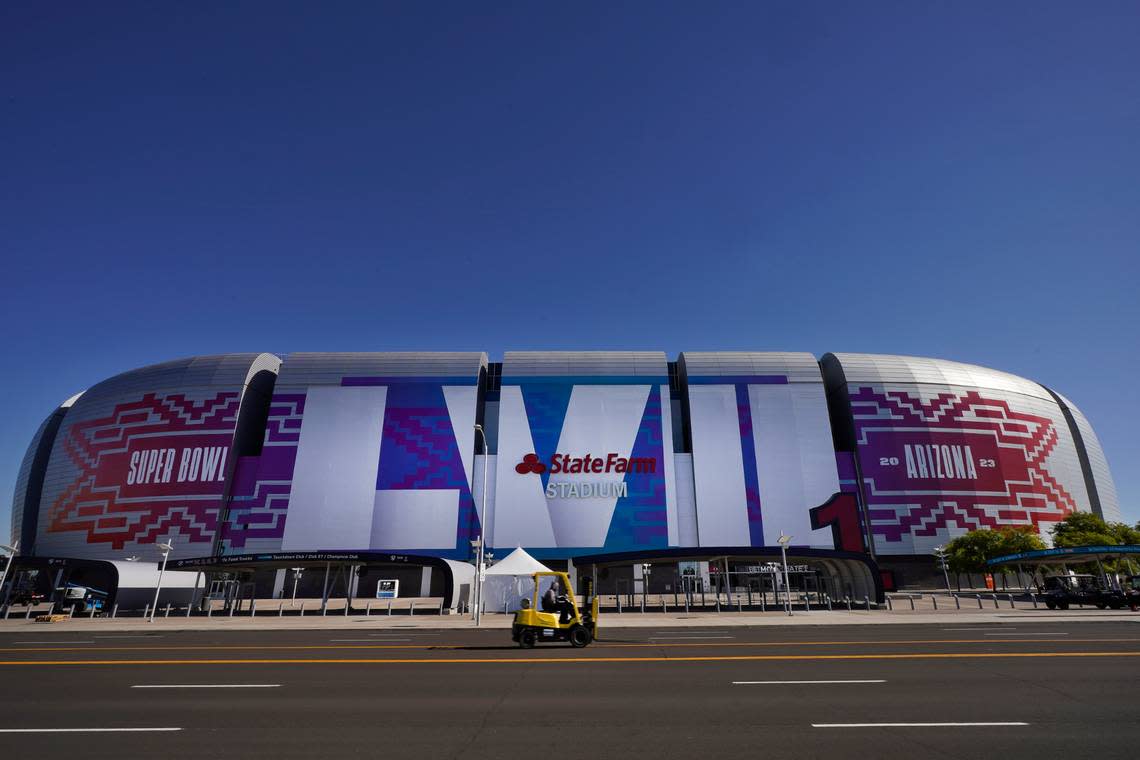Who’s James Weldon Johnson? The history and lyrics behind ‘Lift Every Voice and Sing’

Often called the Black national anthem, “Lift Every Voice and Sing” will be performed before thousands of cheering football fans at Super Bowl LVII on Sunday, Feb. 12.
The song holds a special place in the Black American community and served as a “solemn yet hopeful appeal” in the fight for liberation at the beginning of the 20th century. The hymn’s origins trace back to a segregated school in Jacksonville, Florida, led by activist and author James Weldon Johnson, according to the NAACP.
Emmy Award-winning actress Sheryl Lee Ralph is set to perform the song during the pregame show at State Farm Stadium in Glendale, Arizona, where the Kansas City Chiefs will take on the Philadelphia Eagles.
Thank you! See you on the 40 yard line @SuperBowl https://t.co/vqSWPWAOD6
— sheryl lee ralph (@thesherylralph) February 6, 2023
Kickoff is set for 6:30 p.m. ET.
Ralph had “a moment of like, ‘What me? They want me to sing at the Super Bowl? Yes,’” the “Abbott Elementary” star told Entertainment Tonight.
Here’s what to know about James Weldon Johnson and the history behind “Lift Every Voice and Sing.”
Who wrote it?
“Lift Every Voice and Sing” was penned by James Weldon Johnson and set to music by his brother John Rosamond Johnson, CNN reported. The pair got their start in show business and later joined the fight for civil rights for African Americans.
James, the elder brother, was multi-talented and served as executive secretary of the NAACP for a decade, the organization’s website says. During his career, he was also a poet, lawyer, diplomat and key figure in the Harlem Renaissance.
John, described as a musical prodigy, sang and composed alongside his brother during the Harlem Renaissance, according to Florida’s Division of Arts and Culture.
Together, they “elevated the ‘Negro Songs’ from music that promoted negative stereotypes of African Americans to sophisticated tunes that were used in Broadway musicals,” the department said.
When was it written?
James wrote the song as a poem in 1900, and his brother composed music to the lyrics five years later, according to Florida’s Division of Arts and Culture.
“My thoughts began buzzing round a central idea of writing a poem about [President] Lincoln but I couldn’t net them,” James wrote in his autobiography, according to Time. Instead, he wrote a song about Black people persevering in the face of racism and oppression in the U.S.
When was it first performed?
“Lift Every Voice and Sing” was first performed by a choir of 500 students at the segregated Stanton School in Jacksonville, Florida, to commemorate President Abraham Lincoln’s birthday, the NAACP said.
James Weldon Johnson was the school’s principal at the time.
“Set against the religious invocation of God and the promise of freedom, the song was later adopted by NAACP and prominently used as a rallying cry during the Civil Rights Movement of the 1950s and 1960s,” the organization’s website says.
What are the lyrics?
“Lift Every Voice and Sing” has three stanzas, though the first stanza is typically sung during performances and events. The lyrics begin:
Lift every voice and sing / Til earth and heaven ring, / Ring with the harmonies of Liberty; / Let our rejoicing rise / High as the listening skies, / Let it resound loud as the rolling sea. / Sing a song full of the faith that the dark past has taught us / Sing a song full of the hope that the present has brought us / Facing the rising sun of our new day begun / Let us march on till victory is won.
See the full lyrics here.
How did it become the Black national anthem?
Over the years, the song gained popularity at schools, church services, celebrations and events, McClatchy News previously reported, citing The Jaxson magazine. It continued to be shared communally and was dubbed the “Negro National Anthem” by 1920, according to The Atlanta Journal-Constitution.
“Lift Every Voice and Sing” was used to uplift and mobilize people to action during the civil rights movement. Often sung during planning meetings for the Montgomery Bus Boycott, its lyrics were also quoted in speeches by Dr. Martin Luther King Jr., according to Time.
More recently, superstar Beyoncé performed it when she headlined the Coachella music festival in 2018. The NFL also featured the song before each game during the first week of the 2020 football season, McClatchy News reported.
Ohio cops unveil cruiser to celebrate Black History Month — but use fake MLK quote
‘D.C’s favorite centenarian’ Virginia McLaurin, who danced with Obamas, dies at 113
This news team is made entirely of Black women. Texas station says it’s a first in US
